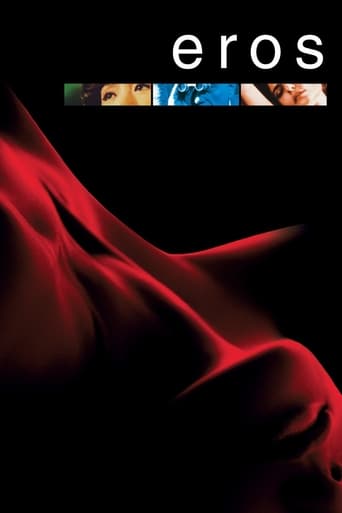Pierre Radulescu
'Eros' brings together three very different filmmakers, who are telling us, each in his own way, stories about love/lust/desire/dreams.The first segment (The Hand) is made by Wong Kar -Wai, with Christopher Doyle as cinematographer. It's a pure gem, gorgeous and intoxicating. Two very good actors: Gong Li and Chen Chang (the bandit from 'Crouching Tiger, Hidden Dragon'). It's the Weltanschaung of Wong Kar-Wai, where eros is actually a mean to meditate about time: time that heals everything while not solving anything; time that's as illusory as happiness is; time that breaks any hope in the end, while showing you that it doesn't matter.I found the segment on youTube; unfortunately it has no subtitles, so if you aren't familiar with Chinese you are kind of lost. I will try to summarize the plot: a tailor sends an apprentice to one of his rich customers, who is a high-class courtesane in her prime; she has the sadistic impulse to humiliate sexually the boy. This creates a strange dependence of unrequited lust, that grows through the years, while the courtesane is gradually loosing her status. The rich patrons leave her, the means to keep her style are vanishing and she eventually becomes a prostitute of the lowest kind. The apprentice remains attached to her down to the end and puts all his erotic desire in creating a dress that substitutes for him the woman.Let's pass now to the second segment (Equilibrium), created by Steven Soderbergh. It's a different kind of an animal: a voyeuristic puzzle based on circular references. A guy (wonderfully played by Robert Downey Jr.) comes to the shrink to complain about an obsessive recurrence: a splendid woman appears naked in his dreams, bathing and dressing in front of him. The shrink puts the patient on the coach and makes him tell all details, while trying to live the dream by himself ! Eventually the patient falls asleep on the coach and the shrink leaves the room. The patient wakes up in front of the woman of his dreams: she's actually his wife and the dream was the visit to the doctor! Or the other way around :) As for the third segment (Il filo pericoloso delle cose - The Dangerous Thread of Things), made by Michelangelo Antonioni, it was considered by many reviewers as the weakest part of the movie. Actually the segment of Antonioni is exquisite: an erotic fantasy subtly suggesting the sagesse of women in these matters. And you cannot compare the three segments in any way; each one follows a totally different approach.
Edgar Soberon Torchia
After reading a few negative reviews, I recently watched "Eros" and was pleased with the whole film. The three stories are the views that Michelangelo Antonioni, Steven Soderbergh and Wong Kar-Wai have of eroticism, and in two of them the segments are what one would expect of their creators, confirming the auteurist film theory. Antonioni's "Il filo pericoloso delle cose" --inspired by texts from his book, "Quel bowling nel Tevere"-- is vintage Antonioni. Of the three filmmakers, he is the only one who choose a contemporary story, probably to prove (at least to himself) that after 40 years of making his tetralogy of alienation, men and women are still literally wandering and talking but not communicating, again women find solidarity among themselves, and technology is as usual an obtrusive part in the landscape of human relationships. The erotic element in this story is the rawest and most elemental of the three segments, triggered by a sex-hungry male who is depressing to his wife, and a toy to an occasional sexual partner; while the style is perhaps the purest, or at least the one told with the greatest economy of resources: few shots, sparse dialogue, natural sets, and a very simple storyline. In contrast, Soderbergh's "Equilibrium" has as many camera set-ups as possible, different levels of narration, alternate monochromatic and color sections, two stars, and an oblique-oniric-videoclipistic approach to eroticism, that mostly relies on Psychology 101 criteria, a strategy that, I guess, is intended to be funny. I did not find it very funny, although watching Alan Arkin made me smile, as he made me remember his maniac performances in "The Russians Are Coming, The Russians Are Coming", "Catch-22" and "Last of the Red Hot Lovers". I wondered what the short was doing in this compilation film, but since that is how Soderbergh views eroticism, that I respect. The final section , Wong's "The Hand", based on the tale "The Twilight of the Bottom Dancer" (according to the director in an interview), illustrates the generalized (or maybe "cliched" would be a more appropriate adjective) notions of what the artistic approach to eroticism should be (for example, the tailor introducing his hand in a dress), but Wong and cinematographer Christopher Doyle are remarkable image-makers, and Gong Li and Chang Chen give very good performances, that I guess that for a modern moviegoer this must be the best segment. It is very good indeed, with soft transitions, measured rhythm, and good dramatic structure, covering a long lapse in a few minutes, but I see it as the fine conclusion of what Antonioni started and Soderbergh continued. A good film, perhaps better to be seen alone, with no interferences.
rumfoord
I rather enjoy watching short films. Like short stories, there's seldom room for more than one good idea, so that idea has to be done well--in the hands of a skilled director, this is an opportunity rather than a limitation. Eros is a collection of three such films, ostensibly sharing a similar theme.Wong Kar Wai's "The Hand" is the first film, and is a premiere example of what a short film can achieve. A concise story about a tailor and a high class prostitute, "The Hand" distills the love/lust theme into a beautiful, intoxicating gem. It is by far the best film of the bunch, perhaps even one of the director's finest.Steven Soderbergh's "Equilibrium" is the second film in the trio, and features a few shots of a naked woman and a long and unrelated dialog between Robert Downey Jr and Alan Arkin. As far as I can tell the film has vanishing little to do with love, lust, passion or sex--and not much else to say about anything. Soderbergh, who's often hit-or-miss, misses big time with this convoluted short.Michelangelo Antonioni's "Dangerous thread" (or however it is properly translated) is quite different from the previous two films. It is certainly on message, featuring lots of full frontal nudity and some sex, but doesn't really have much of a story. It actually feels like it is much closer to succeeding than "Equilibrium", if only because it seems to fit comfortably within its time constraints, but the vacuous plot leaves you bored.In the end Eros is a missed opportunity. After the first film you expect a beautiful tapestry of ideas and perspectives, but it never materializes. Nevertheless, the first film is well worth watching--easily justifying a rental or screening.
zetes
Wong's film seems to come from the same universe as In the Mood for Love and 2046, which does give you the feeling of been-there-done-that. But, still, it is beautiful and nearly as hypnotic as those two films. Soderbergh's film is slight, but highly amusing. Robert Downey Jr. and Alan Arkin are fantastic. Antonioni's segment is pretty worthless. It feels like European softcore art-porn. But, really, would it surprise anyone that his film is the least of this bunch? As far as cinematic history is concerned, Soderbergh shouldn't be mentioned in the same sentence as Wong, and Wong probably not quite in the same sentence as Antonioni. But, let's face it, Antonioni hasn't made a good film in three decades. I'd still suggest watching Eros for the first two segments. If you can keep your curiosity in check, just shut it off before the third begins.




